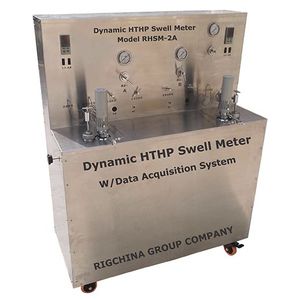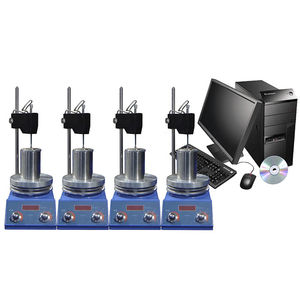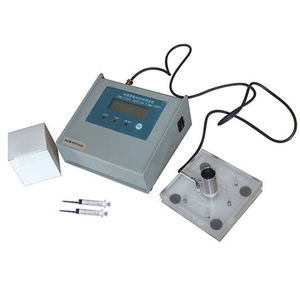
- Products
- Dynamic linear swell meter
- RIGCHINA GROUP COMPANY

- Products
- Catalogs
- News & Trends
- Exhibitions
Dynamic linear swell meter HLSM-84-head
Add to favorites
Compare this product
Characteristics
- Other characteristics
- dynamic linear, 4-head
Description
Description
Helps determine shale hydration or dehydration
Problems such as stuck pipe, tight hole, washout, and sloughing can be related to shale stability. Tests used to determine if a specific shale is likely to cause problems include the capillary suction time (CST) test and the linear-swell meter (LSM) test. CST test results show the inhibitive effects of various slats and their concentrations on the dispersion of a shale.
The Linear Swell Meter is designed to simultaneously test up to four drilling fluids (expandable to eight) on a representative shale sample for extended periods of time at temperatures up to 200°F.
The Linear Swell Meter (LSM) helps determine shale hydration or dehydration by measuring the increase or decrease in length over time of reconstituted or intact shale core. Together the LSM and Capillary Suction Time (CST) tests determine the recommended mud system for drilling through a specific shale formation. First, a CST test is conducted to determine the correct inhibitor for the shale. Then, a variety of fluids are tested.
Test results are graphed to show the percent of swelling versus swelling time in minutes. The LSM test demonstrates the inhibitive effects of these various fluids on shale swelling.
Most swell meters are designed to test shale samples in static fluid. However, fluids circulate as you drill, so testing shale samples in a static environment does not always provide accurate readings.
Technical Parameter:
1, Stirring Speed: 0-2500rpm
2,Working Temperature:0-93℃ (200℉)
3,Measuring Range:0-20mm
4,Accurancy:0.01mm
5,Sample Diameter:28.6mm
6,Measuring Units 4 head
7,Power supply : 230V, 50/60 Hz
Catalogs
No catalogs are available for this product.
See all of RIGCHINA GROUP COMPANY‘s catalogsOther RIGCHINA GROUP COMPANY products
Shale Testing & Shear Strength
*Prices are pre-tax. They exclude delivery charges and customs duties and do not include additional charges for installation or activation options. Prices are indicative only and may vary by country, with changes to the cost of raw materials and exchange rates.





